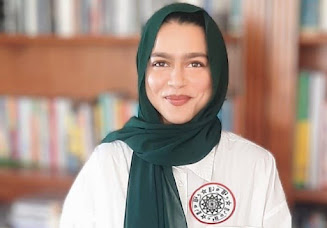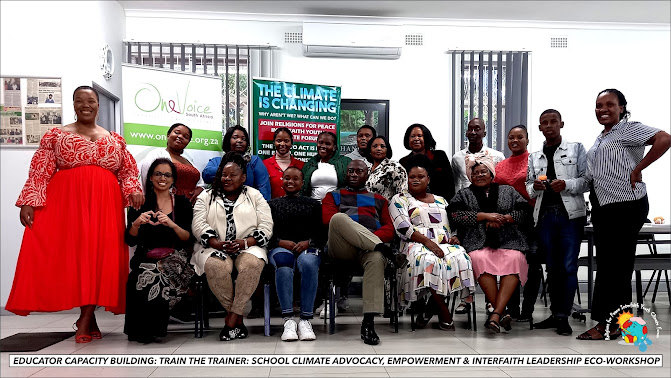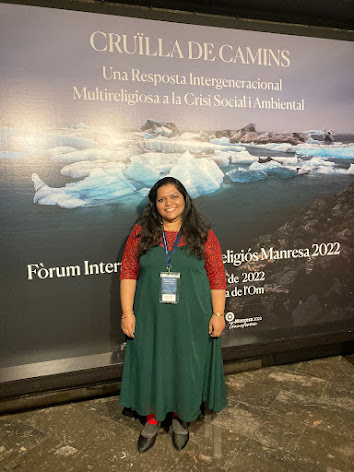The Greatest Teacher is Life Itself!
Reflections by: Raeesa Shaikh from Durban, South Africa,
08 June 2022
Member of RfP Interfaith Youth Climate Forum, Ansari Qadiri Rifai Tariqa (AQRT), Ansari Youth Club (AYC)
(Pictured Left)
The pattering of rain on my window harmonized by the earthy petrichor smell stirs up nostalgic childhood memories of playing barefoot outside as the comforting drops of the rain washed over me. I live in Durban, South Africa, which is blessed with some of the most breathtakingly lush landscapes. It is also home to some of the most warm and welcoming people, sun drenched beaches and aromatic and culturally diverse food.
Photo Credit: <a
href='https://www.freepik.com/photos/rain-umbrella'>Rain umbrella photo
created by rawpixel.com - www.freepik.com</a>
The rain that day felt like any other. As the night approached there was an uneasy apprehension and wariness around. Tensions rose as leaks began to appear in homes and roads began overflowing with water. People were nervous for the night ahead and the day to come. We checked on our families and friends, kept our phones charged, talked about ‘go bags’ and evacuation plans should the need arise. What would we take? What were priority items if you had to leave your home knowing it would not be okay? Where does one go?
I’m reminded of a teaching the Prophet Muhammad (peace be upon him) shared with us, a prayer: “O Allah grant us rain that is beneficial.”
As a student, on the Sufi path, I value walking and interacting with nature, as it provides a space for me to strengthen my connection with Allah/God Almighty through His manifestations, which is everywhere. The air, soil, trees, even a rock has secrets to share and lessons to teach if we want to learn, if we listen, and are grateful.
As such I often go to a place much loved by the locals, Giba Gorge. It has been a sanctuary and place of comfort for me and many in our community. The hiking trail boasts unique flora and fauna. I would often stop along the path to breathe in the crisp air, watch birds and insects go about their days in perfect synchronization and would listen to the waterfall and river nearby.
After the floods in April I was keen to get back to nature. A trip to Giba gorge beckoned. As I arrived my eyes widened with horror - the landscape was unrecognizable. In a short space of 48 hours, everything had changed. The roads that cars traveled on was nonexistent, there were no traces of the paths I once walked nor the trees I held as landmarks. So much destruction, yet it felt like a realignment, a balance, a new way of being for Giba. The staff hopeful and filled with purpose, were busy crafting new paths. A river now flowed with a force and power I had not seen before, beautiful, astute, clean, fresh water running for as far as the eye could see. Beautiful rock surfaces I had never seen before, now revealing its unparalleled beauty. Nature was reclaiming itself and it was awe inspiring. While the path was new, and my feet unsteady, navigating this new landscape awakened in me the reality of climate change, ocean conservation, land conservation and all the initiatives that aim to not only conserve but restore balance to a land that is struggling, an earth that is suffering.
A mistake that is made all too often and a tale
as old as time, is humanity’s destructiveness, greed, lack of gratitude and
limited understanding of this beautiful world we live in.
Prophet Muhammad (peace be upon him) shared many insights and values that human beings may ascribe to, the wisdom and science of these values help me better understand and live a sustainable life in harmony with earth. Shaykh Nishaat Ahmed Siddiqi (my Shaykh) shared with me that in order to “realize and manifest the essence of Islam, which is to submit, we ourselves must cultivate it as a state of being. It is to develop a relationship of submission to, and trust in the All Merciful One. This requires a development of our conscious intention and a mindfulness of our interconnectedness with all of creation.”
We are increasingly faced with environmental challenges. The way we interact and live on earth has implications for each of us and the environment. It is all connected, we are connected. The earth, plants, animals, oceans and people are all connected. How we live on earth, what we do or don’t do in our daily lives impacts not only us, it impacts the environment we live in - as was evident by the recent catastrophic rains and extreme weather changes seen locally and globally.
A teaching of the prophet (peace be upon him) is: ‘If any person plants a tree or sows a field, and a human, bird or animal eats from it, shall be reckoned as charity for him.’ The encouragement and active caring for earth is a long-standing tradition in Islam and has been shown to us in the Quran and through the lived experiences of the Prophet (peace be upon him). As human beings we are blessed with critical thinking, physical ability and free will. It is a great privilege and responsibility for us to use these to show gratitude to Allah and to care for the earth and its animals as the earth cares for us.
Allah says in Quran: “and We made every living thing of water” (translation by Murshid Shaykh Taner Vargonen Ansari).
To conserve our resources and use these wisely is demonstrated in the following narration from our beloved Prophet (peace be upon him): ‘Do not waste water even if performing ablution on the bank of a fast-flowing large river.’ Here we see how one should value resources, like water, to utilize these in a sparing manner and with mindfulness regardless of the abundance in nature. Daily activities such as bathing and performing ablution for our prayers are to be done with this awareness and gratitude.
As the population grows the demand on the earth and its natural resources increases, conservation becomes an important part of maintaining balance in our diverse, vast ecological and interconnected systems.
We’ve all heard of ‘reduce, reuse and recycle’. Did you know that the Prophet (peace be upon him) practiced this in his lifetime more than 1400 years ago? The clothes he wore would often get holes or tears in them due to daily use, over a long period of time.
He would always have his clothes and shoes mended as opposed to having these thrown out and replaced with something new. Of course, we may buy new clothes and enjoy these items but to be aware of what we buy, how its sourced and importantly being mindful of why we’re buying something helps foster greater sustainability in our environment, and not to mention a better financial standing for many.
The concept of taking care of the earth and all its animals is intricately woven into the belief system of every Muslim. We are mindful of our existence on earth, whatever we do, we do it with consciousness and connection, to show gratitude to Allah for His beautiful and sustaining creation, we show thanks to the earth and all its animals, to ensure future generations get to share in the goodness of earth and to be good human beings. The visit to Giba Gorge changed the way I saw and understood the world and my existence in it. Going forward I will use these practical measures as well as many others to ensure my existence does not harm or take away from mother earth. To be a habitat for love as the earth is a habitat of love and mercy for me and all of humankind.As a fellow conservationist I ask: "How will you
show love to our planet?"
Visit our Facebook page to be informed of upcoming events: https://www.facebook.com/RFP.IYCF







Comments
Post a Comment